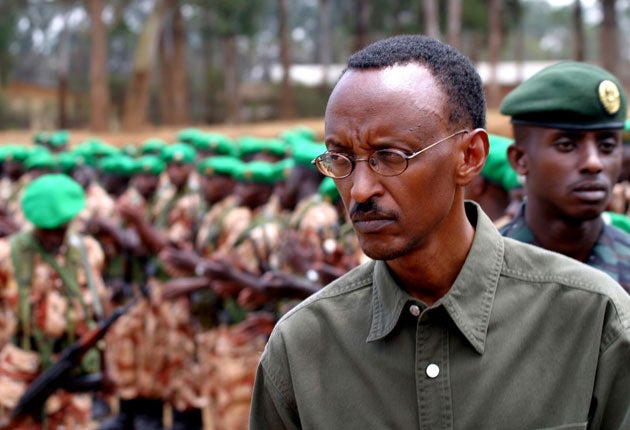Rwanda is not ready for the medicine of democracy, says Kagame
Avoiding more ethnic violence is a priority, the President tells Sarah Rundell in Kigali

Your support helps us to tell the story
From reproductive rights to climate change to Big Tech, The Independent is on the ground when the story is developing. Whether it's investigating the financials of Elon Musk's pro-Trump PAC or producing our latest documentary, 'The A Word', which shines a light on the American women fighting for reproductive rights, we know how important it is to parse out the facts from the messaging.
At such a critical moment in US history, we need reporters on the ground. Your donation allows us to keep sending journalists to speak to both sides of the story.
The Independent is trusted by Americans across the entire political spectrum. And unlike many other quality news outlets, we choose not to lock Americans out of our reporting and analysis with paywalls. We believe quality journalism should be available to everyone, paid for by those who can afford it.
Your support makes all the difference.Paul Kagame, the only leader Rwanda has known since the end of the genocide, has said his country is not ready for the "medicine" of democracy ahead of elections in August.
The 52-year-old former guerrilla leader told The Independent that feeding the country's burgeoning population and avoiding a relapse into ethnic violence are more of a priority for now than the "niceties" of democracy and human rights.
Speaking at his presidential office set in lush gardens in the hilly Rwandan capital, Kigali, he said: "We have made huge progress but I have no illusions about how far we still have to go."
Mr Kagame is famous for his punctuality, and any member of his staff arriving after 7am finds the door has been locked. Supporters claim that the discipline, born of his military background, work ethic and sense of urgency, has underpinned Rwanda's resurgence since the 1994 genocide. His anti-corruption efforts continue to impress foreign donors and he is almost certain to win re-election by a significant margin, but awkward questions are being asked about his leadership.
Critics accuse the autocratic Mr Kagame of preventing all forms of opposition. Since the election year began, newspapers have been closed, senior military figures sacked and opposition leaders have complained of harassment and threats.
These complaints are dismissed by the President. He "had nothing to do with" the recent banning of two independent newspapers; the generals dismissed in a military shake-up were guilty of corruption; and he accuses presidential rival Victoire Ingabire, who heads the opposition party United Democratic Forces, of using ethnicity to garner support.
Other opposition candidates, like the Democratic Green Party's Frank Habineza, can register their parties and stand as long as they "abide by the rules". He added: "A strong opposition is not my responsibility."
Quietly spoken and given to philosophical flourishes, he states that perhaps Rwanda isn't yet ready for a dose of democratic "medicine". "Democracy has two sides: substance and form," he explains. "Sometimes they are packaged together and you must swallow it as a medicine. We share the substance, meaning the definition, but how that is expressed is contextual."
"Democracy and human rights are niceties and are all important, but tell me, if somebody is wondering if they have anything to eat, they are not listening," he continues. "It's a fact that when somebody has food, when you bring another message, then they listen."
Mr Kagame believes Rwanda should be allowed to develop its own way of dealing with its past, free from the critical eye of "teachers" in the developed world. "We have not had the luxury to do things according to the rule book. We have to experiment, to see if it works. The West has democracy but it also has the institutions to hold people accountable." He cites as one example Rwanda's own solution to the challenge of balancing justice and reconciliation without a proper legal system in the aftermath of the genocide. Gacaca courts gave perpetrators the chance to ask forgiveness from their communities. "This is a problem for which we generated our own answer."
The trauma of his past still informs his daily life. A wave of ethnic violence in 1960 forced his family to flee to Uganda where he grew up in a refugee camp. "Everything I got I had to earn and I had to fight for. I am still fighting now. There is not a single day that passes without this sense."
He believes foreign critics fail to grasp the dynamics at play in Rwanda and says he sees role models in countries like Singapore and South Korea. "Developing countries are on the receiving end all the time, of being pushed back, of people saying that's where you belong. We are not deterred by what outsiders think. I am not guided by criticism. What we want to achieve is for ourselves. If you ask Rwandans how they feel about the government they will give a different view from outsiders."
Mr Kagame won the 2003 election after securing 95 per cent of the vote. Economic growth, which touched 11 per cent in 2008, is fundamental to "accelerating the healing", he says.
Foreign investment has risen from a trickle to $120m (£83m) and Rwanda now pitches itself as a business hub in East Africa. He has won plaudits for governance in a region renowned for corruption and has halved dependence on aid in the past 15 years. If he stands for a third term in 2017, he will have been President since 2003 and in power, de facto, since 1994. When I ask if he is planning to stand, he fixes me with a fierce gaze. "There is a constitution and I will respect it. Give me the benefit of the doubt."
Join our commenting forum
Join thought-provoking conversations, follow other Independent readers and see their replies
Comments